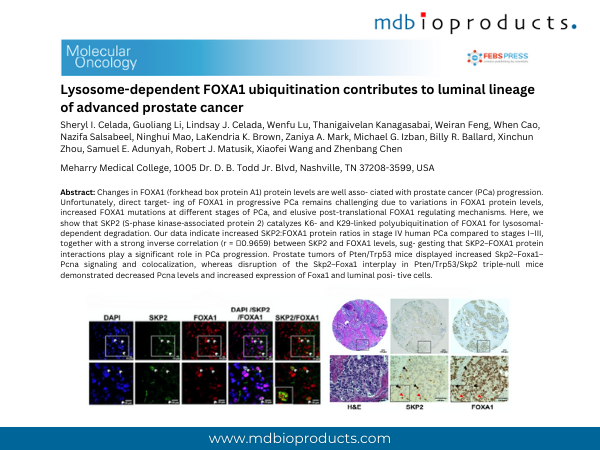
Featured Publication in Focus: Lysosome-dependent FOXA1 ubiquitination contributes to luminal lineage of advanced prostate cancer
Mar 05 , 2024
Authors:
Sherly I. Celada , Guoliang Li, Lindsay J. Celada, Wenfu Lu, Thanigaivelan Kanagasabai, Weiran Feng, Zhen Cao, Nazifa Salsabeel, Ninghui Mao, LaKendria K. Brown, Zaniya A. Mark, Michael G. Izban, Billy R. Ballard, Xinchun Zhou, Samuel E. Adunyah, Robert J. Matusik, Xiaofei Wang and Zhenbang Chen
Department of Biochemistry, Cancer Biology, Neuroscience and Pharmacology, Meharry Medical College, Nashville, TN, USA
FEBS Press. Molecular Oncology. 24 July 2023
----------------------
Products referenced:
Catalogue # 409010
PCR Mycoplasma Detection Kit, 20 assays
----------------------
ABSTRACT
Changes in FOXA1 (forkhead box protein A1) protein levels are well asso- ciated with prostate cancer (PCa) progression. Unfortunately, direct target- ing of FOXA1 in progressive PCa remains challenging due to variations in FOXA1 protein levels, increased FOXA1 mutations at different stages of PCa, and elusive post-translational FOXA1 regulating mechanisms. Here, we show that SKP2 (S-phase kinase-associated protein 2) catalyzes K6- and K29-linked polyubiquitination of FOXA1 for lysosomal-dependent degradation. Our data indicate increased SKP2:FOXA1 protein ratios in stage IV human PCa compared to stages I–III, together with a strong inverse correlation (r = 0.9659) between SKP2 and FOXA1 levels, sug- gesting that SKP2–FOXA1 protein interactions play a significant role in PCa progression. Prostate tumors of Pten/Trp53 mice displayed increased Skp2–Foxa1–Pcna signaling and colocalization, whereas disruption of the Skp2–Foxa1 interplay in Pten/Trp53/Skp2 triple-null mice demonstrated decreased Pcna levels and increased expression of Foxa1 and luminal posi- tive cells. Treatment of xenograft mice with the SKP2 inhibitor SZL P1-41 decreased tumor proliferation, SKP2:FOXA1 ratios, and colocalization. Thus, our results highlight the significance of the SKP2–FOXA1 interplay on the luminal lineahge in PCa and the potential of therapeutically targeting FOXA1 through SKP2 to improve PCa control.
